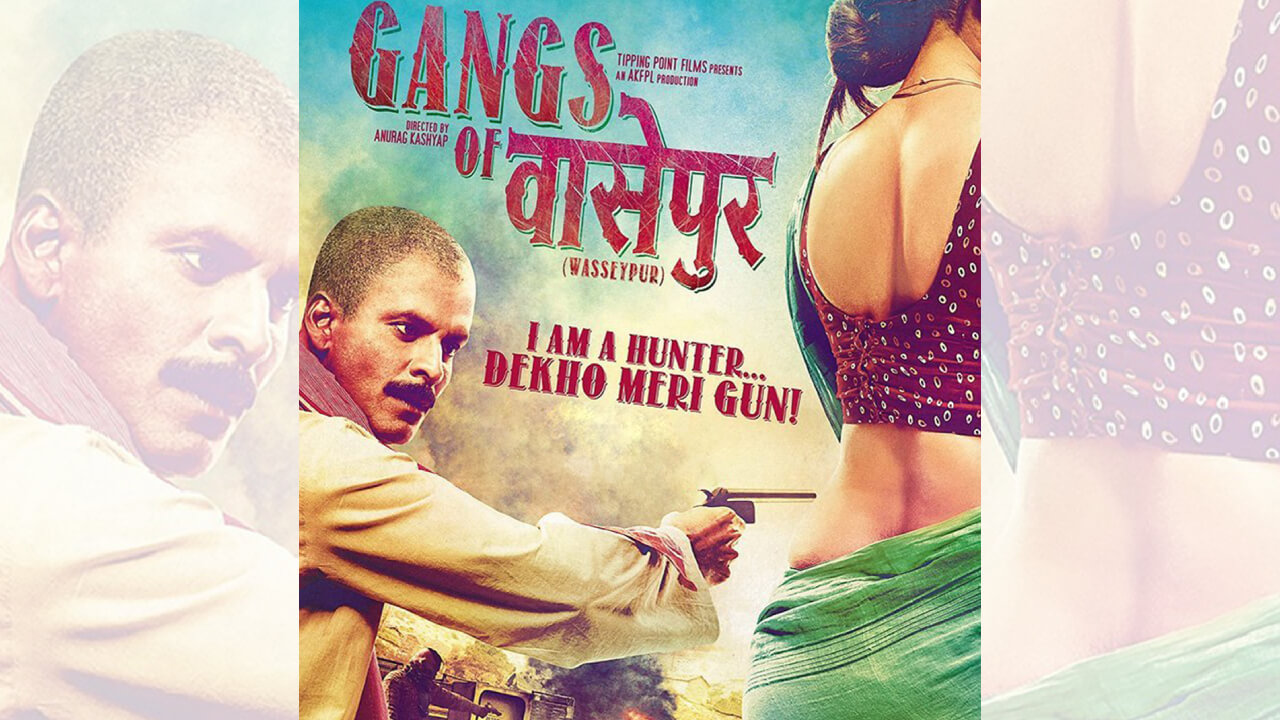This is a strangely dichotomous world where music and songs mock the characters’ subverted hero-giri. While the characters indulge in their unmanned violence we the audience become numbed participants in the rites of the wrong-doing. Unlike the other Bihar-UP-mein-bawandar films the almost-ritualistic slaughter of all rules of civil conduct in Gangs Of Wasseypur is not redeemed by the presence of any hero. Even the main protagonist in Kashyap’s bloodthirsty saga is a certifiable rogue named Sardar Khan.
As played by Manoj Bajpayee in what is arguably his most feisty and filled-out performance to date, Sardar Khan is a second-generation criminal and social outcast. In the film’s unforgettable prologue Sardar’s father (Jaideep Ahlawat, incredibly in-character) serves as a henchman to the powerful local politician (Tigmanshu Dhulia). Politician has Daddy killed by a hired assassin who could be teaching social science in a village school, and Sonny-boy grows up swearing revenge.
This in a nutshell, could be the plot for a cheesy 1980s’ potboiler. In taking the grammar and language of the formulistic vendetta drama from the 1970s and 80s (there’s even a broad and prominent homage to the Big B in Yash Chopra’s Trishul) and converting it into a crackling saga of compelling contemporary currency, Anurag Kashyap turns all the rules of mainstream Hindi cinema on its head. He uses the language of Manmohan Desai and Narinder Bedi’s cinema. But he applies these to characters who are as far removed from the world of escapism is Sicily is from Wasseypur.
Oh, did we really say Gangs Of Wasseypur was derived from The Godfather? Nah. Silly shallow reading of the clannish gang-war theme. The two worlds are inter-connected only by their legacy of lineage and violence. Beyond that Kashyap’s mode of storytelling, and the way his characters loom over the proceedings without become caricatural, are frighteningly original and as liberated of reference-points as any of the path-breaking films on gang wars that have emerged out of Hollywood in the last 25 years.
Kashyap celebrates the drama of the grotesque with the relish of a 7-‘coarse’ meal. No details in the non-stop brutality are kept off camera. We can count the number of thuds and stabbing sounds every time a victim is cornered and done to death. Violence on this level has never really been a part of mainstream Hindi cinema before. The end of cinematic niceties is here. Take it or leave it.
Kashyap in Wasseypur legitimizes gore with glorious gusto. In the gang-war that he portrays with such feral immediacy, victims are chopped up piece by piece, their body parts sent to the butcher’s to eliminate legal evidence. A finger floating in a cesspool of stale blood is a commonplace sight in the world of unchecked mayhem that Kashyap has constructed with such casual resplendence. His team of technicians are unconditionally mired in the mood of violence. Rajeev Ravi’s camera mows through the imaginary world of Wasseypur with a devilish dispassion.
The film looks layered and even luminous in texture. But the tone of narration is detached. The dereliction of the damned and doomed characters is neither romanticized nor demonized Indeed Gangs Of Wasseypur invents a new language of cinematic expression. It creates a world where the characters inhabit a universe of vapid stagnant violence. And yet the narration, never short of breath even in the most breathless state of violence, exudes a kind of vibrancy that comes from neither rejection not acceptable of an undesirable situation. It comes from within the characters. As they battle each other in bitter futile feuds they also seem to be battling the demons within themselves. The synthesis of what lies within and without is devastating.
And yet for all its outward show of ruthless machismo Gangs Of Wasseypur is a film with a heart. There is a rather enticing love story featuring Bajpayee, his screen wife (debutante Richa Chadha) and the Other Woman (Reema Sen) tucked away in the folds of the ferocious tale.
That Bajpayee’s wife is played by firebrand Richa Chadha is a very happy happening in this sad but savagely funny tale. She is quite the discovery of the year, and that too in a film mottled with exceptional performances by Bajapyee, Nawazuddin Siddiqui as his son (more of him in Wasseypur 2), Tigmanshu Dhulia (clenched controlled and combative as the villain in chief), Pankaj Tripathi (riveting as Bajpayee’s belligerent enemy), Piyush Mishra (remarkably restrained and wise as Bajpayee’s mentor and guide) and Huma Qureshi (another whammy performer whom we will see more of in the sequel)
In fact every character, big or small, is cast with what looks like first-and-last options. You can’t imagine any other actor playing any of the myriad parts.
Brutal, brilliant, dark, sinister, terrifying in its violence and yet savagely funny in the way human life is disregarded Gangs Of Wasseypur is one helluva romp into the raw and rugged heartland.


